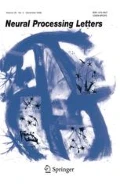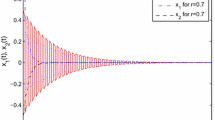Abstract
In this paper, the impulsive effects on the finite-time stability of neural networks with time-varying delay are considered. Several novel criteria which govern the systems considered are finite-time stable are obtained by the idea of Lyapunov–Krasovskii functional and the average impulsive interval method. Moreover, the proposed sufficient conditions can be simplified into the form of linear matrix equalities which can be easily checked by Matlab LMI toolbox. The results proposed show that the model can achieve stable in finite time with stabilizing impulsive effects on one hand, and it can preserve the finite-time stability property in presence of destabilizing impulses on the other hand. Numerical examples are presented to demonstrate the effectiveness of the obtained results.


Similar content being viewed by others
References
Zhang HG, Wang ZS, Liu DR (2014) A comprehensive review of stability analysis of continuous-time recurrent neural networks. IEEE Trans Neural Netw Learn Syst 25(7):1229–1262
He X, Li CD, Huang TW, Li CJ, Huang JJ (2014) A recurrent neuralnetwork for solving bilevel linear programming problem. IEEE Trans Neural Netw Learn Syst 25(4):824–830
Pei Y, Liu C, Han Q (2014) Stability of delayed Hopfield neural networks with variable-time impulses. Math Probl Eng
Long SJ, Xu DY (2008) Delay-dependent stability analysis for impulsive neural networks with time varying delays. Neurocomputing 71(7–9):1705–1713
Wang ZS, Zhang HG (2010) Global asymptotic stability of reaction-diffusion Cohen–Grossberg neural networks with continuously distributed delays. IEEE Trans Neural Netw 21(1):39–49
Liu Y, Lu JQ, Wu B (2015) Stability and L2-gain performance for non-linear switched impulsive systems. IET Control Theory Appl 9(2):300–307
Li HQ, Liao XF, Lei XY, Huang TW, Zhu W (2013) Second-order consensus seeking in multi-agent systems with nonlinear dynamics over random switching directed networks. IEEE Trans Circuits Syst I 60(6):1595–1607
Li HQ, Liao XF, Huang TW (2013) Second-order locally dynamical consensus of multiagent systems with arbitrarily fast switching directed topologies. IEEE Trans Syst Man Cybern Syst 43(6):1343–1353
Wen SP, Yu XH, Zeng ZG, Wang JJ (2016) Event-triggering load frequency control for multiarea power systems with communication delays. IEEE Trans Ind Electron 63(2):1308–1317
Zhong J, Lu JQ, Liu Y, Cao JD (2014) Synchronization in an array of output-coupled Boolean networks with time delay. IEEE Trans Neural Netw Learn Syst 25(12):2288–2294
Wen SP, Zeng ZG, Huang TW, Zhang YD (2014) Exponential lag adaptive synchronization of memristive neural networks and applications in pseudo-random generators. IEEE Trans Fuzzy Syst 22(6):1704–1713
Wang X, Li CD, Huang TW, Chen L (2014) Impulsive exponential synchronization of randomly coupled neural networks with Markovian jumping and mixed model-dependent time delays. Neural Netw 60:25–32
Liu Y, Lu JQ, Wu B (2014) Some necessary and sufficient conditions for the output controllability of temporal Boolean control networks. ESAIM Control Optim Calc Var 20(1):158–173
Liu Y, Chen HW, Wu B (2014) Controllability of Boolean control networks with impulsive effects and forbidden states. Math Methods Appl Sci 37(1):1–9
Li XD, Song SJ (2013) Impulsive control for existence, uniqueness, and global stability of periodic solutions of recurrent neural networks with discrete and continuously distributed delays. IEEE Trans Neural Netw Learn Syst 24(6):868–877
Li XD, Shen JH (2010) LMI approach for stationary oscillation of interval neural networks with discrete and distributed time-varying delays under impulsive perturbations. IEEE Trans Neural Netw 21(10):1555–1563
Li CJ, Yu XH, Huang TW, Chen G, He X (2016) A generalized Hopfield network for nonsmooth constrained convex optimization: lie derivative approach. IEEE Trans Neural Netw Learn Syst 27(2):308–321
Wang HW, Liao XF, Huang TW, Li CJ (2015) Cooperative distributed optimization in multiagent networks with delays. IEEE Trans Syst Man Cybern Syst 45(2):363–369
Li CJ, Yu XH, Yu WW, Chen G, Wang JH (2016) Efficient computation forsparse load shifting in demand side management. IEEE Trans Smart Grid 99:1–12
Yang XS, Ho DWC, Lu JQ, Song Q (2015) Finite-time cluster synchronization of TCS fuzzy complex networks with discontinuous subsystems and random coupling delays. IEEE Trans Fuzzy Syst 23(6):2302–2316
Yin JL, Khoo SY, Man ZH, Yu XH (2010) Finite-time stability and instability of stochastic nonlinear systems. Automatica 47:2671–2677
Liu YG (2014) Global finite time stabilization via time varying feedback uncertain nonlinear systems. SIAM J Control Optim 52(3):1886C1913
Moulay E, Dambrine M, Yeganefar N, Perruquetti W (2008) Finite-time stability and stabilization of time-delay systems. Syst Control Lett 57(7):561–566
Yang RM, Wang YZ (2012) Finite-time stability and stabilization of a class of nonlinear time delay systems. SIAM J Control Optim 50(5):3113–3131
Yang RM, Wang YZ (2013) Finite-time stability analysis and \(H_{\infty }\) control for a class of nonlinear time delay systems. Automatica 49(2):390–401
Amato F, Tommasi GD, Pironti A (2013) Necessary and sufficient conditions for finite time stability of impulsive dynamical linear systems. Automatica 49:2546–2550
Wang YG, Shi XM, Zuo ZQ, Chen MZQ, Shao YT (2013) On finite time stability for nonlinear impulsive switched systems. Nonlinear Anal Real Word Appl 14(1):807–814
Mei J, Jiang MH, Xu WM, Wang B (2013) Finite-time synchronization control of complex dynamical networks with time delay. Commun Nonlinear Sci Numer Simul 18:2462–2478
Lee LM, Liu Y, Liang JL, Cai XS (2015) Finite time stability of nonlinear impulsive systems and its applications in sampled-data systems. ISA Trans 57:172–178
Cui WX, Sun SY, Fang JA, Xu YL, Zhao LD (2014) Finite-time synchronization of Markovian jump complex networks with partially unknown transition rates. J Frankl Inst 35(1):2543–2561
Li XD, Bohner M, Wang CK (2015) Impulsive differential equations: periodic solutions and applications. Automatica 52:173–178
Lu JQ, Ho DWC, Cao JD (2010) A unified synchronization criterion for impulsive dynamical networks. Automatica 46(7):1215–1221
Song QK, Cao JD (2007) Impulsive effects on stability of fuzzy Cohen–Grossberg neural networks with time-varying delays. IEEE Trans Syst Man Cybern 37(3):733–741
Forti M, Grazzini M, Nistri P, Pancioni L (2006) Generalized Lyapunov approach for convergence of neural networks with discontinuous or non Lipschitz activations. Phys D 214(1):88–99
Ma Q, Wang Z, Lu J (2012) Finite-time synchronization for complex dynamical networks with time-varying delays. Nonlinear Dyn 70(1):841–848
Acknowledgements
This work was supported by Natural Science Foundation of China (Grant Nos. 61374078, 61633011), Chongqing Research Program of Basic Research and Frontier Technology (Nos. cstc2015jcyjBX0052, cstc2014jcyja40012), and the Science and Technology Foundation of the Education Department of Chongqing (KJ1501317, KJ1601310).
Author information
Authors and Affiliations
Corresponding author
Rights and permissions
About this article
Cite this article
Tan, J., Li, C. Finite-Time Stability of Neural Networks with Impulse Effects and Time-Varying Delay. Neural Process Lett 46, 29–39 (2017). https://doi.org/10.1007/s11063-016-9570-6
Published:
Issue Date:
DOI: https://doi.org/10.1007/s11063-016-9570-6




